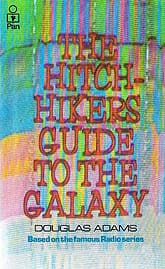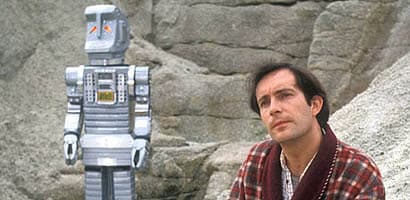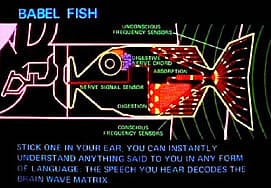The Hitchhiker's Guide to the Galaxy
Critique • Quotes • At the movies
 First edition
First edition• The Hitchhiker's Guide to the Galaxy, 1979
• The Restaurant at the End of the Universe, 1980
• Life, the Universe and Everything, 1982
• So Long, and Thanks for All the Fish, 1984
• Mostly Harmless, 1992
First publication of novels
1979—1992
Literature forms
Novels
Genres
Literary, science fiction, humour
Writing language
English
Author's country
England
Length of first novel
Approx. 46,500 words

Depressed robot Marvin is little consolation for Arthur Dent (Simon Jones) in 1981 TV series.
Guides to an absurd galaxy
The Hitchhiker's Guide to the Galaxy (1981): Television miniseries, six episodes of 31–36 minutes; director Alan J.W. Bell; writer Douglas Adams; featuring Simon Jones, David Dixon, Mark Wing-Davey, Sandra Dickinson, Peter Jones
There's a theory that each successive version of The Hitchhiker's Guide to the Galaxy has lost some of the magic of its predecessor. By this theory, the greatest Hitchhiker of all must have been the first, the 1978 BBC radio program. "Radio makes the best pictures," it is said, as it lets listeners imagine the absurd galactic adventures of Douglas Adams' strange characters. It also forces the audience to focus on the shows' impossibly clever narration and dialogue. Fans of those first broadcasts say they'd never heard anything so weird and wonderful before.
Next up were the novels, starting in 1979 and soon becoming modern classics. Also allowing reader imagination to play a large role.
Then, while the first Hitchhiker novels were coming out, along came the six-episode BBB television series, which also became a worldwide cult favourite. But by showing us what every ridiculous creature and bizarre setting looked like, the program supposedly diluted some of the wonder that radio listeners and readers had experienced.
And, finally, the big movie of 2005, with a big budget and big sets and big special effects, was least effective, because it supposedly gave us too much, like any Hollywood blockbuster—losing Hitchhiker's special charm.
That's one theory. But it doesn't entirely hold up under a closer examination of the two video adaptations we have now.
It's a cheesy universe
Let's first look at that video experience, the television series of The Hitchhiker's Guide to the Galaxy (1981).
The Hitchhiker novels tend to start, stop and jump around in a disorienting (though entertaining) way, reflecting the bewilderment of the Everyman main character. Arthur Dent is thrown into a larger universe that runs on rather different principles than he had thought. The TV series, running a total of three hours, smooths this out a little because, well, we see real people who have real personalities and act something like real people. Even the most bizarre, non-earthlings in the video presentation still have some solidity to them that can be too easily passed over abstractly in text alone.
What helped increase the strangeness in the video series, paradoxically, may be how bad the costumes and special effects were. Remember, this was contemporary with the first Star Wars movies and viewers were just getting used to that sophisticated level of spectacle. The BBC-TV Hitchhiker's Guide to the Galaxy, however, had some of the cheesiest effects this side of Doctor Who (the original Doctor Who with its aliens made from foam and foil wrap).
But somehow it seemed to work for Hitchhiker. And it still holds up. The goofiness of the special effects undercuts any serious critique of the show and lends the universe a kind of homey charm. Something like that first Monty Python film, In Search of the Holy Grail, with its horseless, coconut-clapping knights. It also keeps the focus on the Pythonesque dialogue—on the cosmic jokes. You enjoy Adams's bizarre and hilarious ideas, rather than any scifi eye candy.
Those who had fallen for Hitchhiker on radio accepted that most of the characters, especially housecoat-clad Arthur (Simon Jones) and his friend from near Betelgeuse, Ford Prefect (David Dixon), look much like what they had imagined. Zaphod Beeblebrox's second head is obviously lame (can you say that of a head?) but Mark Wing-Davey pulls off the self-centred adventurer quite well. The various computers are less than impressive, even for 1981 but, again, who cares?
Perfectly in line with the low-budget look of the series are its quite creative graphics—delivering animated pages from the guide of the title. The graphics add a new wow factor for Hitchhiker fans. One look today and you can identify the series' decade. Coloured text and pixillated pictures outlined against black backgrounds like computer screens of the early 1980s, plus early video arcade-style animations reminiscent of Asteroids. And very, very funny.
The smarmily modulated voice of the book is delivered by Peter Jones (no relation to Simon), who had previously narrated the radio show. He actually gets top billing for the series, though we never see him, which is appropriate.
People, like yours truly, who first caught on to the Hitchhiker phenomenon via this short television series had a reaction similar to that of the earlier fans with the radio broadcasts: funniest, weirdest thing we'd ever seen or heard.
Revisiting it today, I'd have to say it no longer has quite the same impact. It no longer threatens to turn our notions of reality upside down. We guffaw over the humour, though we're no longer rolling on the floor. We can anticipate and recite along with much of that once fresh and startling dialogue.
But it's still damn funny. And provocative. The Hitchhiker Guide to the Galaxy series is definitely worth a viewing for fans of Hitchhiker in any other medium. And worth a revisit every now and then.
It's not the definitive Hitchhiker, but there is no definitive Hitchhiker. Not the radio show, not the books, not the TV show or the movie. They're all more or less created by Adams and they all add and subtract little bits. They all give different takes on the evolving Hitchhiker myth.
Isn't it kind of a paradox for an Adams fan to be dogmatic about what can and what can't exist in the Hitchhiker universe?
— Eric
Critique • Quotes • At the movies
1981, 2005


